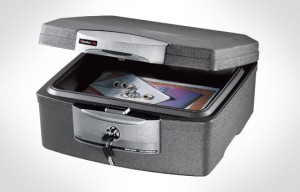A common non-legal question estate planning attorneys get is where you should keep the documents we draft for them. As is so often the case in law, the best answer is “it depends.” For most people, I feel a lock-box inside the house is usually the best solution, but in some cases, the traditional “valuables in the safe deposit box” approach remains a better choice. Here are some of the major considerations:
The Merits of the Fireproof Lock-Box
Most of my clients are people with spouses and children who get along well, or even if they bicker or are distant, have some modicum of respect and integrity amongst them. The kids will know the basics of their parents’ estate plans, and anyone who is asked to be a power of attorney, healthcare representative, or trustee of a trust will get copies of the documents naming them to those positions. You might even give the named executor a copy of your will. In any of these cases, I’m a big proponent of fireproof lock-boxes, like the Sentry 1100 or F2300 (also waterproof, pictured above). These and similar boxes, about the size of two small loaves of bread, can be kept in a bottom file drawer, closet, or under your bed. They are easy to find, can hold all of your important documents, and offer a modicum of fire and water protection. The locks are laughable – on the First Alert version it’s a plastic clasp – but this is usually a good thing: it’s sufficient to keep prying eyes away, but can be accessed in an emergency even without the key.
The boxes retail for $20 – $75 at any office supply store, significantly less at Costco or BJ’s, and somewhere in the middle from a slew of online retailers. If you have no valuables beyond your other documents, this also lets you save the $40 – $60 fee most banks charge for a safe deposit box.
When the Safe Deposit Box is Still Better
If you already have a safe deposit box at the bank for valuables, and have no problem accessing as needed, it is perfectly acceptable to keep estate planning documents there, too. They will be protected from theft, fire, and pretty much anything else. However, they will also be protected from anyone who may need one of those documents who isn’t listed on the bank’s signature card. If all copies of a heath care representative or power of attorney are in the box, and you fall ill or become unable to manage your affairs, your family will not have access to the planning you set in place. If you pass away, the Probate Court can (and routinely will) that your box be opened for retrieval of your will, but if your will contained your burial and funeral wishes, it will be too late to enforce them. My personal practice is to keep those instructions in a separate document that is merely validated by the will to help avoid this problem, but it won’t matter if all of your documents are locked up, and many attorneys still take the traditional approach.
By my account, there are three common scenarios where keeping your documents in a safe deposit box is appropriate:
- There are executed copies of each of your documents in the hands of the person(s) who may need it,
- Aside from your spouse, one or more people have authorized access to the box and access to the key, or
- You are concerned for the security of your documents or you do not want your family to know the contents, and your attorney (or other trusted third party) has executed copies in case they are needed.
Any unique situations this doesn’t address should be discussed in detail with your attorney. Finally, an important caution:
Why File Folders are Bad News
In choosing a storage solution for your estate planning documents, I can not stress this enough: DO NOT JUST KEEP YOUR DOCUMENTS SITTING IN A FILE. Even if you are an exceptionally organized person, there is no guarantee that your spouse and children will know how you organize things and where that file is, or that they will remember after you tell them, or that you will keep things organized the same way as you get older. There is no protection from any sort of damage, and there is a real risk that your family will not be able to find your documents when they need them. Moreover, when a will is known to have been kept in a personal file, but cannot be located upon the individual’s death, the probate courts of many states are instructed to presume that the will was destroyed with the intent to revoke, meaning all of your expressed wishes may be ignored if an invested party can’t prove otherwise. If you are going to keep your documents at home, keep them in a fireproof lock box, or in a proper safe that others have access to.

